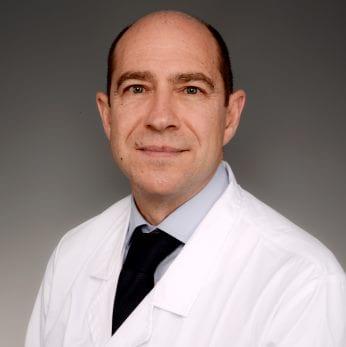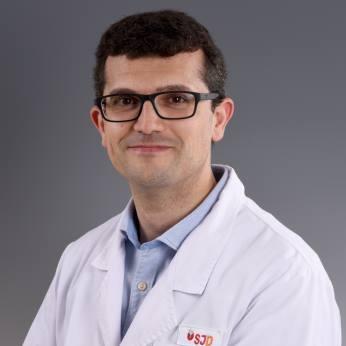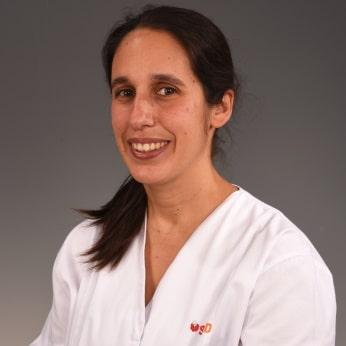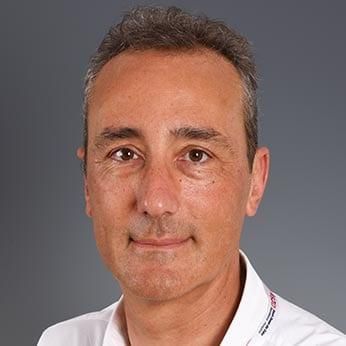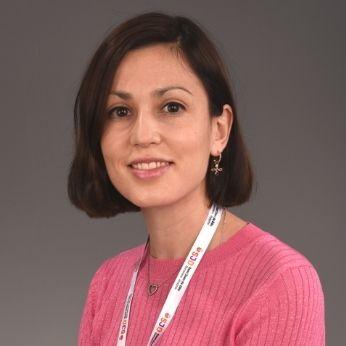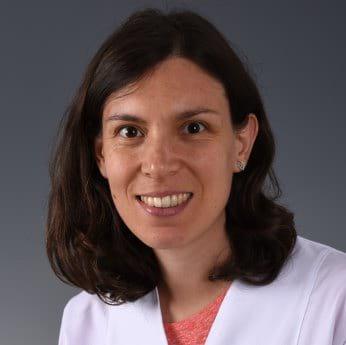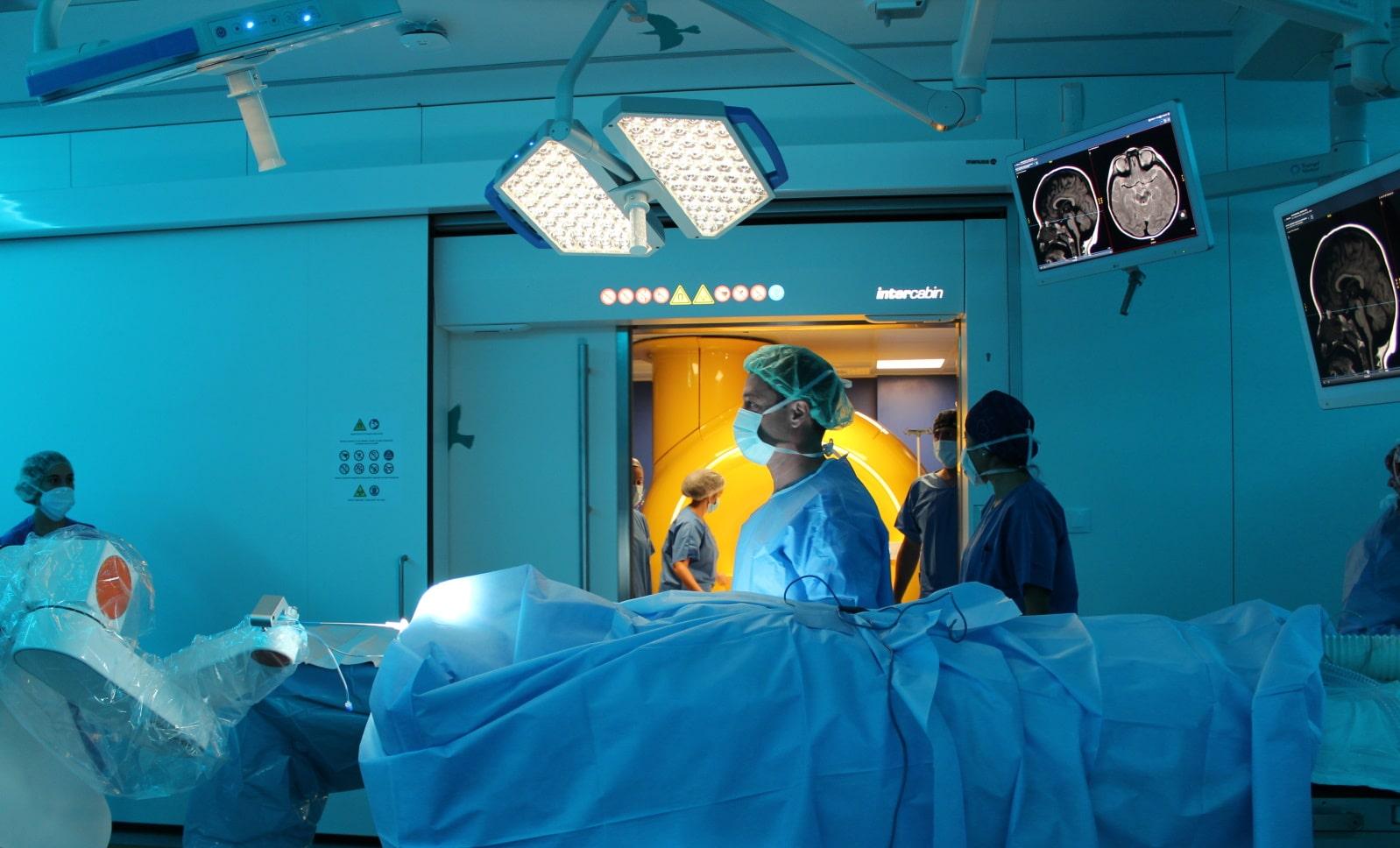
At the Neurosurgery department of the SJD Barcelona Children's Hospital we use high-precision surgical techniques to treat disorders affecting the central nervous system (brain and spinal cord) and peripheral (peripheral nerve).
We perform care work both in general areas, such as craniofacial malformations, pathology of the rachis (spine) and spinal cord (spina bifida) vascular pathology, head trauma and hydrocephalus, as well as in specific areas, the latter in collaboration with multidisciplinary teams: epilepsy and movement disorders, neuro-oncology and foetal pathology, among others.
The Neurosurgery department develops and participates in multidisciplinary programs with sophisticated treatments for: epilepsy surgery, movement disorders, minimally invasive craniofacial surgery, neuroendoscopy, complex neuro-oncological surgery, surgical for spasticity or cranio-cervical disorders (Chiari malformation or craniocervical instability), among others.
We have intraoperative support systems such as neuronavigation, robots, hybrid operating rooms or state-of-the-art microscopes.
We have European accreditations for the treatment of complex craniofacial malformations (ERN CRANIO), epilepsy (ERN EpiCARE) and nervous system tumors (ERN PaedCAN), and we are in contact with other European centers and specialists.
We perform these surgeries within a comprehensive management programme, in collaboration with Primary Care centres and with the rest of the related hospitals (European and national), thus achieving a continuous and close follow-up of our patients, during childhood. and their subsequent follow-up as adults.
Accreditations
- Members of the European Network of Rare Diseases of Craniofacial Anomalies (ERN CRANIO).
- Participants in the European Reference Network for Rare and Complex Epilepsies (ERN EpiCARE) and the European Reference Network for Paediatric Cancer (PaedCAN).
- CSUR of the Ministry of Health as a reference unit in the treatment of:
- Complex pediatric neurosurgery.
- Refractory epilepsy.
- Movement disorders.
- Neuromuscular diseases.
Why SJD Barcelona Children's Hospital?
In 2022, almost 500 surgeries were performed, with a low rate of reoperation and reinfection. These included 120 cases of brain tumours and 45 cases of refractory epilepsy.
Our experience
In 2022, almost 500 surgeries were performed, with a low rate of reoperation and reinfection. These included 120 cases of brain tumours and 45 cases of refractory epilepsy.
- We are pioneers in the use of Deep Brain Stimulation (DBS): implanting a device that sends electrical impulses to specific parts of the brain in order to treat dystonia or movement disorders.
- Specialists in the use of neuroendoscopy as a fundamental tool in many of our interventions: Cranial malformations, hydrocephalus, brain tumours, etc. Thus ensuring minimal invasiveness.
- Application of intraoperative MRI, CT and ECO imaging: We obtain information in real time on the status of the surgery and the patient's anatomy, thus completing a greater number of surgeries with the minimum risk of sequelae.
- Pioneers in Europe in the use of laser ablation for tumour removal and treatment of epilepsy.
We are pioneers in minimally invasive surgery used in Neurosurgery.
Our operating rooms
We are pioneers in minimally invasive surgery used in Neurosurgery.
- We are pioneers in minimally invasive surgery used in Neurosurgery. In the early 1990s, Dr Ferrer, former head of the Neurosurgery department at Hospital Sant Joan de Déu Barcelona, introduced the use of brain endoscopy in Spain. In 2020 we added one laser surgery system to our equipment, being pioneers in Europe in the use of this technology. As a result, our patients recover faster, postoperative procedures are much more comfortable and potential after-effects are minimised.
- We practise neuronavigation-assisted microsurgery. On an MRI of the patient in real time we can guide ourselves intraoperatively to see where we are moving.
- We have a state-of-the-art robotic platform for microsurgery (vascular surgery, oncology, etc.).
- We perform robot-assisted stereotaxic surgery (epilepsy surgery, movement disorders, etc.). This allows us to select any place in the brain to act on with minimal risk.
- For complex surgeries we have intraoperative neuromonitoring systems, controlled by an expert team in neurophysiology, which allows us to safely advance in our interventions with minimal risk of sequelae.
- Highly qualified nursing and anaesthesia teams specialised in the field of neurosurgery.
- High quality intraoperative imaging systems such as: magnetic resonance, computed tomography, ultrasound and hybrid operating room for application in craniofacial surgery, spine and vascular surgery.
All of this constitutes one of the most technological operating rooms in Europe which, together with our human team, makes us an international reference service in Paediatric Neurosurgery.
We are a group of more than 600 professionals of all paediatric specialities trained at the world's best hospitals.
Teamwork
We are a group of more than 600 professionals of all paediatric specialities trained at the world's best hospitals.
Increasingly, the world of medicine is focused on teamwork. We have been managing the different pathologies for years based on decisions taken jointly in the corresponding multidisciplinary committees or units, most of which are held weekly (neuro-oncology, craniofacial, epilepsy, vascular, etc.), thus optimising the results obtained.
Specialties and services
Related Units
We diagnose and treat movement disorders, relying on research to improve treatment
We are a reference centre for the diagnosis and treatment of drug-refractory epilepsy.
Pathologies we treat
Treatments we offer
Our professionals
Optimistic and passionate in our efforts: the child is an extraordinary patient, the plasticity of his brain plays in our favour and allows it to recover exceptionally well despite sometimes aggressive treatments. A large percentage of children with tumours of the nervous system achieve a complete cure.
Research
Committed to research, our professionals have a multitude of scientific articles published or in development.
We are part of the BRAIN project:
- Preoperative navigation and real-time 3D navigation in the operating room. Dr Hinojosa Mena-Bernal; Dr Munuera del Cerro.
- Anatomical-functional correlation in eloquent motor and language areas using pre- and intra-operative magnetic resonance imaging and navigated transcranial magnetic stimulation. Dr Hinojosa Mena-Bernal; Dr Becerra Castro; Dr Climent Perín; Dr Muchart López; Dr Candela Cantó.
We collaborate with the Oncology Department in other projects such as:
- Trial Concept Intercontinental YC-MB LR MB.
- LOGGIC EUROPE
- SIOP EPENDYMOMA II: An International Clinical Program for the Diagnosis and Treatment of Children, Adolescents and Young Adults With Ependymoma (Phase II-III) - BE
- We also collaborate with the Achondroplasia Unit in the various tests they carry out.
We have action protocols for the different pathologies.
Our technology at the service of science: We evaluate our results and share our experience in order to improve that of other centres.
Teaching
SJD Barcelona Children’s Hospital is a university hospital affiliated with the University of Barcelona, taking part in the training of medical and nursing professionals. In 2023, the Neurosurgery Department has been distinguished as a reference training center by the Federación Latinoamericana de Sociedades de Neurocirugía (latin american federation of neurosurgery societies, FLANC).
As it is a leading national centre in a multitude of pathologies, we receive residents from both the Spanish MIR (Hospital Resident) system, and already trained specialists from many parts of the world who want to carry out internships with us.
